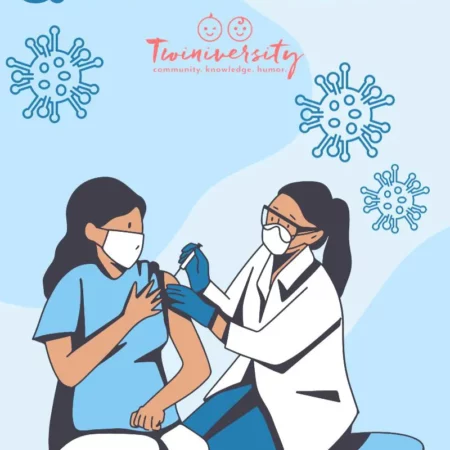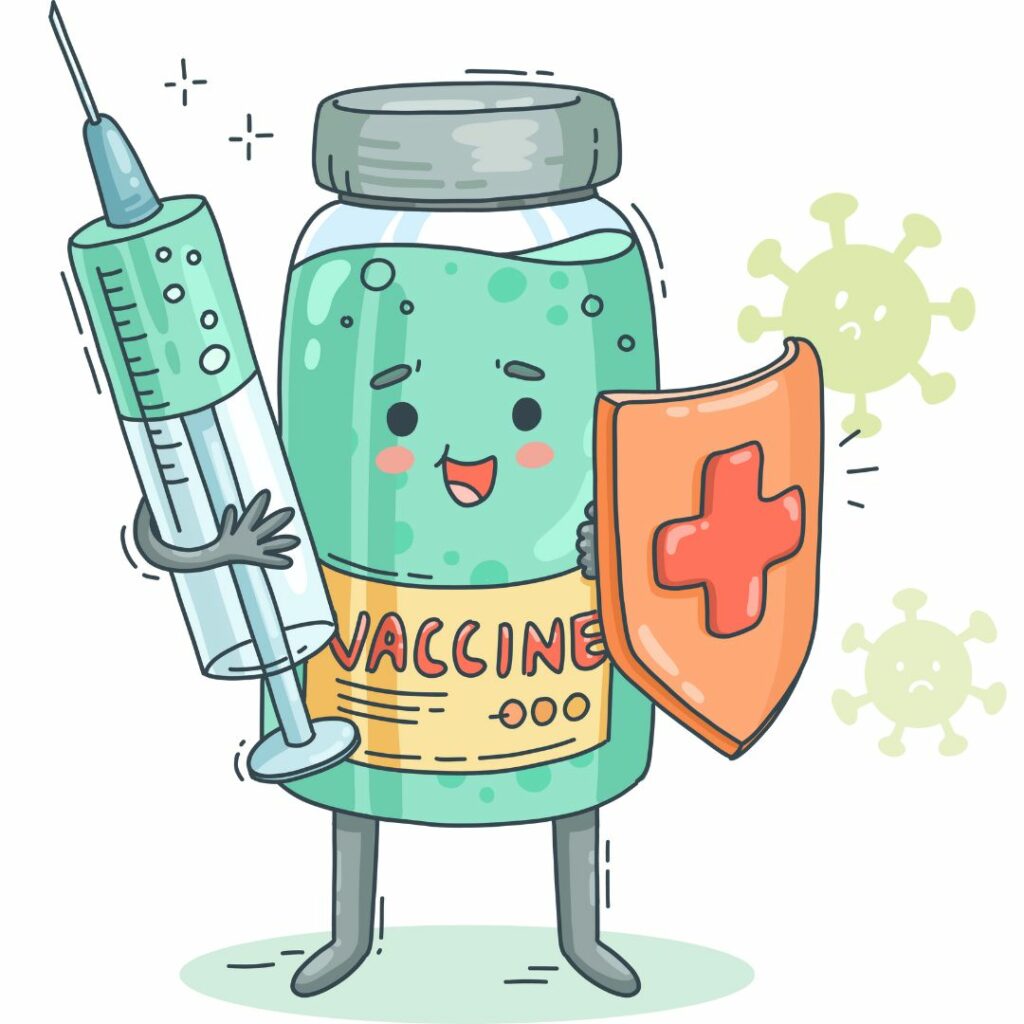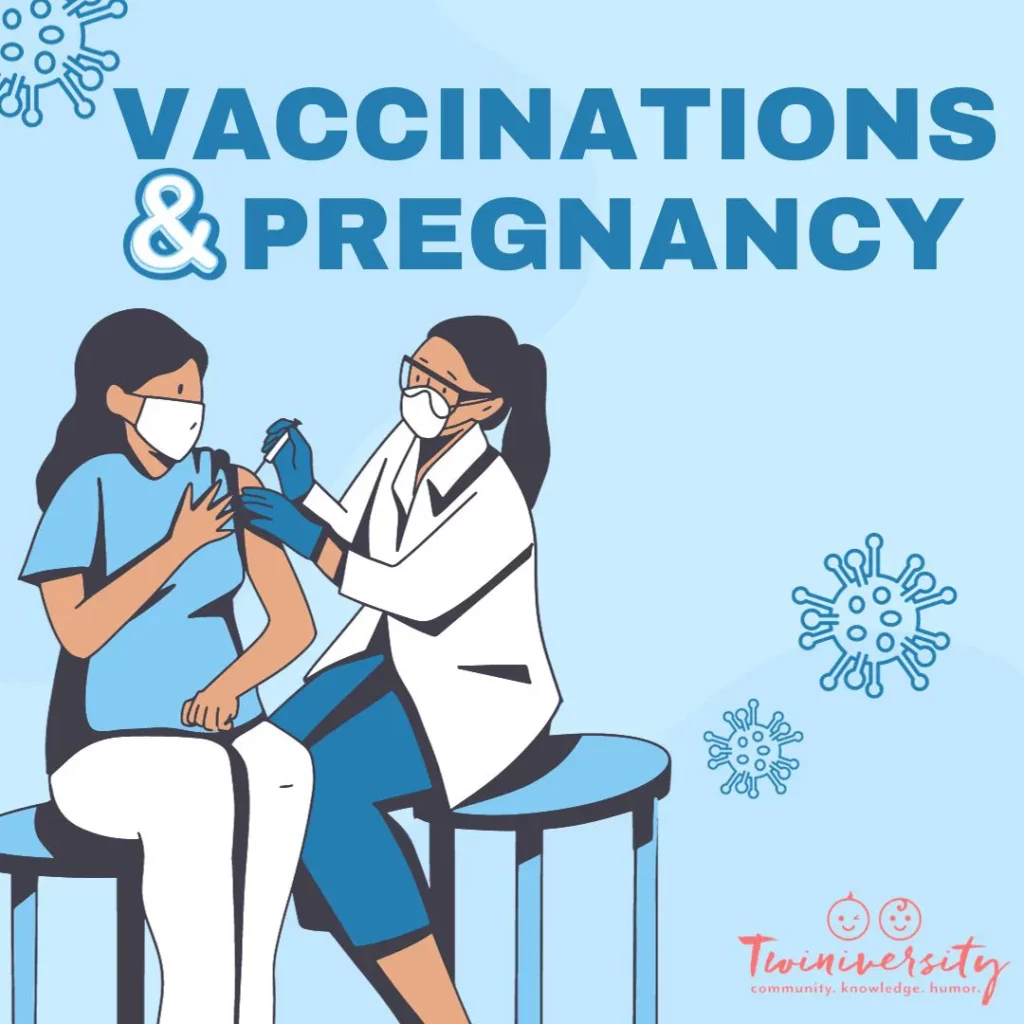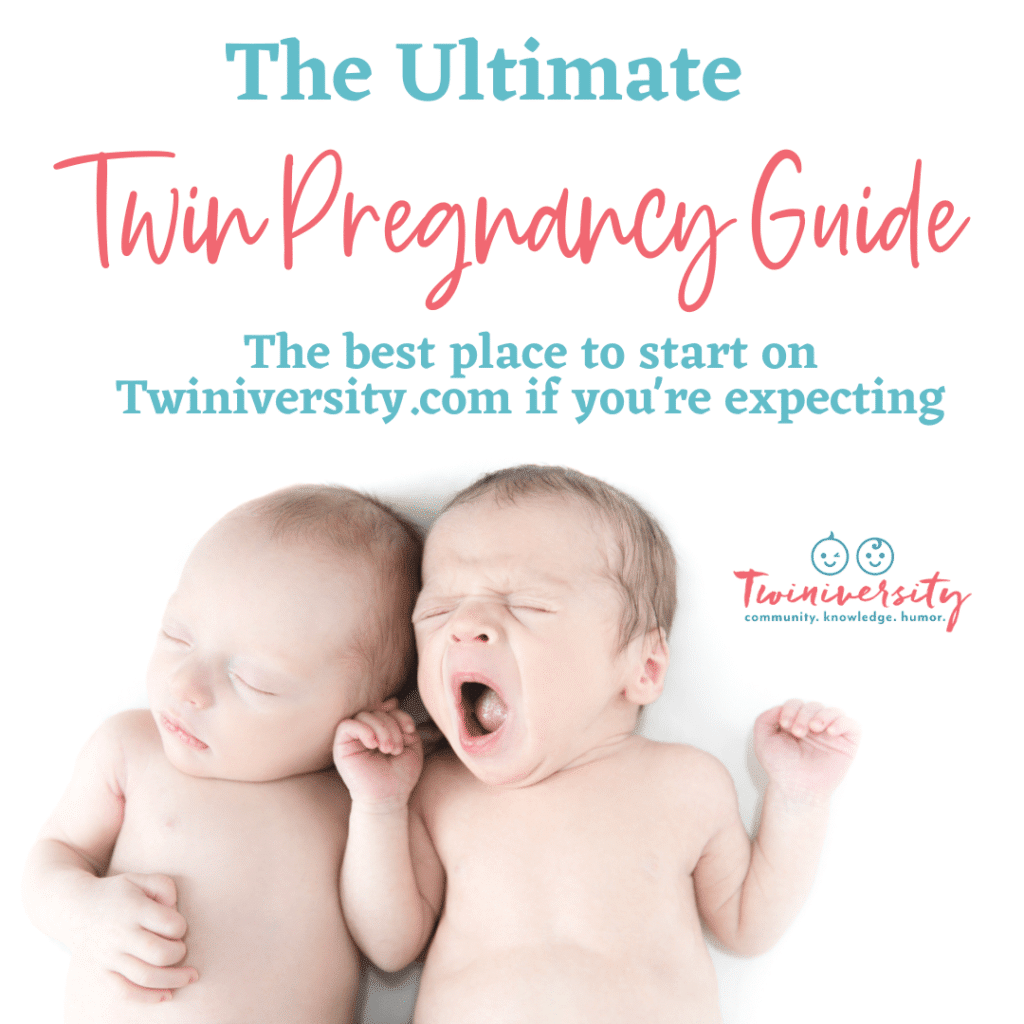
When you are expecting twins, the journey of pregnancy becomes twice as exciting and overwhelming. From dealing with morning sickness to fatigue, there is already a lot on your plate. Amidst all these concerns, it’s crucial not to forget about the importance of pregnancy vaccines.
This article was not written to be a part of the “do we vaccinate or not” debate. Your opinions on vaccination are valid, however, so are ours. Twiniversity is pro-vaccine until valid worldwide research shows us differently. This article is for informational purposes only and should not be considered to be a treatment plan for any individual situation. Use of this site and the information contained herein does not create a doctor-patient relationship. Always seek the direct advice of your own doctor in connection with any questions or issues you may have regarding your own health or the health of others.
During pregnancy, a woman’s immune system goes through some big changes. Some of which can make her more prone to infections. Vaccines are typically safe to get while pregnant and can protect both the mom and her babies in the crucial first months. So, what vaccines should you think about if you’re expecting twins?

Recommended Pregnancy Vaccines
The Centers for Disease Control and Prevention (CDC) recommends all pregnant women receive these 4 vaccines during each pregnancy:
Tdap
Tdap stands for Tetanus, Diphtheria, and Pertussis (whooping cough), and this vaccine protects against all three. All of which can be very dangerous for newborns. Whooping cough is a highly contagious respiratory tract infection and can be extremely serious in young babies. This vaccine is very safe for pregnant women. The CDC recommends all pregnant women receive Tdap between the 27th and 36th weeks of pregnancy. But the sooner, the better. You will need a booster for this every 10 years and a great way to remember your next one is to know you’re due when your kiddos hit their double digits (10th birthday).
Flu Shot
When pregnant, you have a higher chance of running into flu-related troubles that can mess with both your health and your babies. Getting a flu vaccine during pregnancy passes antibodies onto your unborn twins, making it less likely they will get the flu for several months after they are born. According to a 2018 study from the Clinical Infectious Diseases Journal, the flu shot reduced a pregnant woman’s risk of being hospitalized with the flu by an average of 40%.
If you’ll be pregnant during the peak flu season between December and February, think about getting the flu shot. However, you can actually get the flu shot in any trimester of your pregnancy.
Pregnant with twins and not sure where to start? Visit the Ultimate Twin Pregnancy Guide to find all the top articles and resources to get you ready for twins. While you’re at it, check out our expecting twin classes and Twiniversity shop!
Covid-19
Pregnant women face higher risks of pregnancy complications and preterm birth if they get COVID-19. To reduce these risks, get vaccinated. Everyone aged 6 months and older, including pregnant individuals, should get the COVID-19 vaccine. Vaccination not only protects you but also shields your twins until they become eligible for the vaccine. Even better news, our National Institue of Health also says “breast milk from mothers who have been vaccinated or recovered from a SARS-CoV-2 infection contains maternal antibodies against the virus”. So not only will your baby(ies) benefit during pregnancy, they will benefit during your breastfeeding adventure as well.
RSV
As of September 2023, the CDC suggests all pregnant women get the respiratory syncytial virus (RSV) vaccine to safeguard their newborns from severe RSV illness. The Pfizer RSVpreF (Abrysvo) vaccine is the ONLY Respiratory Syncytial Virus (RSV) vaccine approved for use during pregnancy to protect infants from RSV-associated lower respiratory tract infection. The vaccine should be administered during weeks 32 through 36 of pregnancy. True, there are medications that can be given to your kids (nirsevimab) to help prevent RSV, however you should know that “Except in rare circumstances, most infants younger than 8 months of age do not need nirsevimab if they were born 14 or more days after their mother got RSV vaccine” according to the CDC. That’s great news. One more vaccine for you means one less for your kids.

Why is it important to get vaccines during pregnancy?
Protecting yourself and your babies from infectious diseases is simple: get vaccinated. Not only does it shield you from nasty infections, but it also passes on that superhero-like protection to your growing babies. Think of it as a double dose of defense! Those early months will be worry-free, as your little ones will be less likely to catch harmful diseases. And let’s not forget about you, mama! By boosting your immune system during this vulnerable period, you’ll be less likely to experience any severe symptoms. But remember, it’s crucial to talk to your healthcare provider to make sure you’re choosing the right vaccines for a safe and healthy pregnancy.
Potential risks and concerns
It is natural to have concerns about receiving vaccines during pregnancy, as you want to prioritize the safety of your babies. However, researchers have extensively studied the safety of these vaccines during pregnancy, demonstrating their effectiveness in preventing diseases and complications.
Some potential risks and concerns associated with vaccines during pregnancy include:
Allergic reactions: While allergic reactions to vaccines are rare, they can occur. It is important to inform your healthcare provider about any allergies you may have before receiving a vaccine.
Mild side effects: Like any medication, vaccines can cause mild side effects such as pain or swelling at the injection site, low-grade fever, and fatigue. These side effects are usually temporary and resolve on their own.
Vaccine timing: The timing of vaccines during pregnancy is crucial for maximum effectiveness. It is important to follow the recommended schedules and consult with a healthcare provider to ensure proper timing.

Overall, the benefits of receiving vaccines during pregnancy far outweigh the potential risks. Vaccination not only protects the mother from potentially serious illnesses but also provides crucial antibodies to the baby, offering them some protection in their early months of life. By following the CDC guidelines and discussing vaccination options with a healthcare provider, pregnant individuals can make informed decisions to safeguard their health and the health of their unborn child.
What vaccinations should family members get to be around my twins?
When it comes to protecting your newborn twins, ensuring that family members are up-to-date on their vaccinations is crucial. Newborns have delicate immune systems and are more susceptible to infections, making it important to create a safe environment for them. Let’s discuss the vaccinations that family members should consider getting before being around your twins.
- Tdap Vaccine: Protects against Tetanus, Diphtheria, and Pertussis (whooping cough).
- Flu Vaccine: Protects moms and babies from the Flu.
- MMR Vaccine: The MMR vaccine shields against measles, mumps, and rubella.
- Varicella Vaccine: Also known as the chickenpox vaccine.
- Hepatitis B Vaccine: Protects against Hepatitis B.
- Pneumococcal Vaccine: Protects against pneumonia, meningitis, and other infections caused by the Streptococcus pneumoniae bacteria.
If a vaccine is annual or a booster is needed, make sure family, friends, or caregivers receive them at least 2 weeks before making snuggly twin contact. It is important to note that while these vaccinations can help protect your twins from potential infections, they are not 100% foolproof. Even if everyone is up to date on their vaccinations, it is a good idea for anyone to wash their hands thoroughly with warm water and soap or to use hand sanitizer before holding your babies.

Does flu shot transfer to baby?
Getting a flu shot while pregnant is your first line of defense in protecting your babies and yourself from the flu. The flu vaccine, made from inactivated viruses, can’t give you the flu. Instead, it triggers your immune system to produce antibodies, safeguarding you and your baby from the flu. These antibodies can also pass to the baby, giving them some protection during their early months when they can’t get the vaccine themselves.
It’s worth mentioning that the flu shot is a yearly deal – flu strains change, and the vaccine gets an update. If you’re pregnant, make sure to grab that flu shot as soon as it’s out each year to keep yourself protected.
What side effects have pregnant people experienced from flu shots?
- Soreness, redness, and/or swelling from the shot.
- Headache.
- Fever.
- Muscle aches.
- Nausea.
- Fatigue.
These side effects are the same as those experienced by non-pregnant people. These side effects usually resolve on their own within a few days.
Serious side effects from the flu shot during pregnancy are extremely rare. The CDC and other health organizations closely monitor the safety of vaccines, including the flu shot. They haven’t found any link between getting the vaccine and a higher risk of miscarriage or birth defects.
If you are pregnant and experience any concerning symptoms after receiving the flu shot, contact your healthcare provider for guidance.
Should I get a flu shot if my baby will be born in September?
You should get a flu shot, no matter when they’re due.

What vaccines can you not get while pregnant?
Non-recommended vaccines during pregnancy:
- Human papillomavirus (HPV) vaccine.
- Measles, mumps, and rubella (MMR) vaccine.
- Live influenza vaccine (nasal flu vaccine)
- Varicella (chicken pox) vaccine.
- Certain travel vaccines: yellow fever, typhoid fever, and Japanese encephalitis.
If you get any of these vaccines and then find out you are pregnant, talk to your doctor. Further doses of the vaccines, if needed, should be given after you have completed the pregnancy.
Many vaccine-preventable diseases are now rare in the United States but are still common in other parts of the world. If you plan on traveling outside of the country while pregnant, be sure to talk to your doctor about safe places to visit and any vaccines that might be recommended. You are going to want to avoid places with a high risk of Zika or Malaria, for example.
Vaccinations can be a polarizing subject for many people, but it is important to remember the reason we are free of so many diseases is because vaccines are preventing them from returning or spreading. These twin pregnancy vaccines have been proven safe during pregnancy, and they can prevent life-threatening illnesses and complications from occurring. When navigating the wonderful world of vaccines, it is best to bring up the conversation early with your doctor so you can be well prepared to stay on schedule and protect yourself and those twins! As your due date approaches, you will assuredly have plenty of other things on your plate.

Maddison Ellison is a mom to vibrant and mischievous twin toddler girls. She works as a nurse in the Denver metro area and enjoys getting outside with her twins, husband, and sheepadoodle, Rosie. Maddison is inspired by health, wellness, the magic of everyday life, and of course, coffee.











